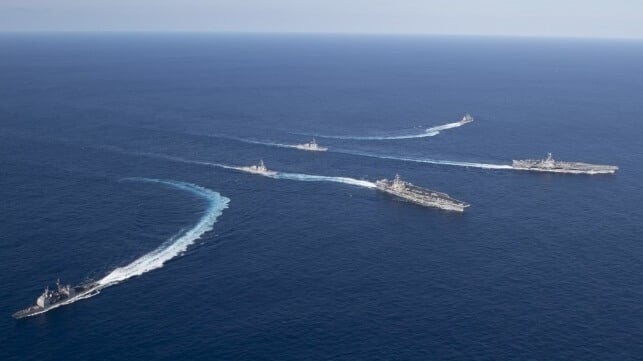Indo-Pacific Command's Chief Warns of Hard Limits of Unmanned Systems

In a wide-ranging conversation at the Brookings Institution on Tuesday, Indo-Pacific Command chief Adm. Sam Paparo cautioned against overreliance on unmanned systems in a Taiwan Strait or South China Sea conflict. Though he has spoken extensively on the value of drone systems, he emphasized that it's important not to lose sight of the "laws of physics" of sea power in the vastness of the Pacific Ocean - particularly for sustainment.
"You're going to have to sustain those forces in [Naval Facility Okinawa, Japan] over wide ranging space. You're going to need air and maritime superiority," he said, noting that the Pacific battle space measures about 8,000 miles by 8,000 miles. "I don't think a Victory Garden is going to do it for those folks [in Okinawa] over the course of a war."
The defense community is drawing new lessons from the war in Ukraine, but Paparo emphasized that those lessons only go so far. Ukraine has all of Europe behind it for secure logistics, while Russia has an endless expanse of more Russia. Both are well-defended, and the war is largely restricted to a narrow band of contested space at the front line. This is much different from a Taiwan Strait scenario, he said.
"There's a war of attriction in [Ukraine], and we're learning a lot about electronic warfare, and we're changing the game," said Paparo. "But if you think that's all of it and we can quit on everything else in the Pacific - how are we going to sustain everything else if we completely give up on air and maritime superiority in the Pacific? . . . The PRC has 2,100 fighters. They’ve got three aircraft carriers. They have a battle force of 200 destroyers. 'Oh, well, roger; we’ve got a couple of drones. No problem.'"
He refused to comment on the progress of Project Replicator, a plan to deploy thousands of attritable drones that could be used to defeat Chinese forces in the event of an invasion of Taiwan. But he did insist that such devices must have a "man in the loop" for lethal engagements, and suggested that the concept of an "attritable" device should come with a realistic price tag.

that matters most
Get the latest maritime news delivered to your inbox daily.
"Attritable systems should [cost] . . . hundreds or thousands of dollars, and reusable systems can end in a different number. We shouldn't confuse that when we're making these choices," he said.
Paparo ended the conversation not on hardware, but on the value of American soft power. He said that he cherishes the strategic advantage that the U.S. military gets when it helps allies with disaster relief and medical assistance. "I value it every bit as much as I do the dynamic demonstration of combat power," he said. "Soft power becomes hard power in conflict."
